
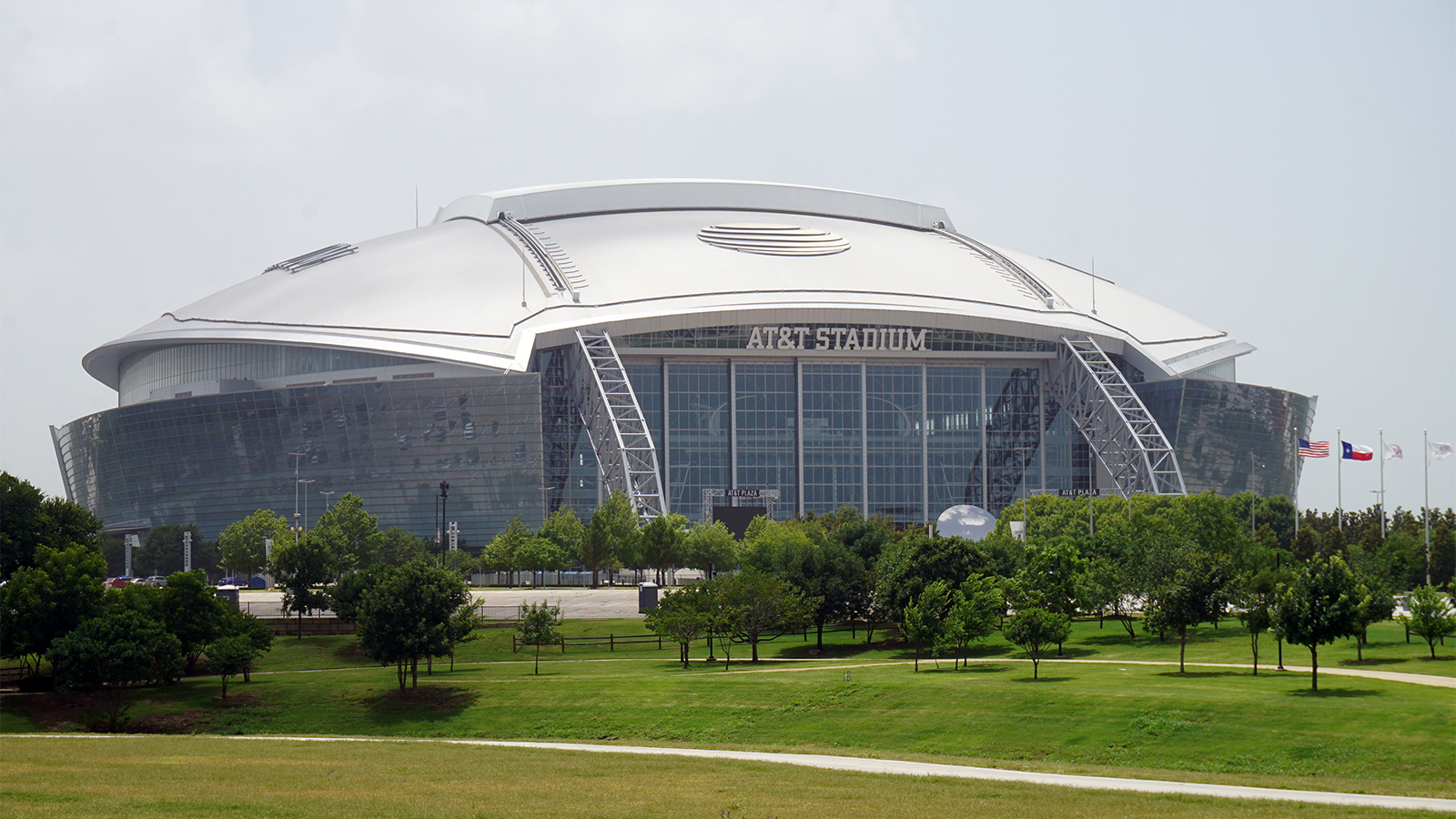
Promise Keepers will be meeting at AT&T Stadium in Arlington, Texas. Photo by Michael Barera/Creative Commons
(RNS) — More than 80,000 men are expected to gather at the Dallas Cowboy’s stadium in Arlington, Texas, Friday and Saturday (July 16-17) for the Christian men’s organization Promise Keepers’ first major in-person event in two decades. It’s a stunning revival for what was once a men’s ministry staple that was part tailgating rally and part contemporary worship service and drew well-known pastors, Christian business leaders and athletes and their followers by SUV loads.
James Merritt, a pastor and an erstwhile Promise Keepers speaker (and father of RNS contributing editor Jonathan Merritt), was awed by the sheer magnitude of the gatherings. “I’ve never seen so many men in one place, singing together, praising the Lord together. There was a real spirit of unanimity and camaraderie.”
Founded in 1990 under the leadership of University of Colorado football coach Bill McCartney, Promise Keepers began with a gathering of 4,200 men at the university’s event center and reached its apex in 1997, when some 700,000 men gathered on Washington’s National Mall to “stand in the gap.” (“I looked for a man among them who would build up the wall and stand before Me in the gap,” says God in the Bible’s Book of Ezekiel, “on behalf of the land so I would not have to destroy it, but I found none.”)
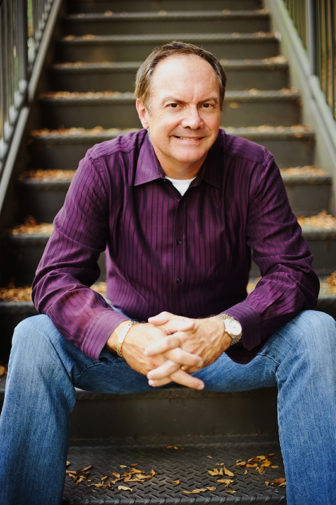
James Merritt is the lead pastor at Cross Pointe Church in Duluth, Georgia. Photo courtesy of James Merritt
Promise Keepers’ purpose? Well, it’s right there in the name, said Merritt, pastor of Cross Pointe Church in Duluth, Georgia, and a past president of the Southern Baptist Convention. “Men should be men of integrity, particularly in their homes — they should be good husbands, good dads, they should be faithful to their wives.
“It was almost a movement to, for lack of a better way of putting it, to maybe ‘tenderize’ men somewhat,” said Merritt.
“I feel like Promise Keepers was very much pushing back against the masculinity I had grown up with,” said Chris Green, a 44-year-old professor of public theology at Southeastern University. He attended a rally in Oklahoma in the mid-’90s with his dad, a former U.S. Marine and motorcycle cop. “I can remember my dad making a comment about how things like this never would have happened for him growing up and he was surprised he was even there.”
“When I think about Promise Keepers, I think of it mostly as a time when men were being expressive of their emotions and tender and repentant. It was anything but a macho-gung-ho rally,” recalled Green.
Author and historian Kristin Kobes Du Mez places Promise Keepers in a long line of evangelical male model makers presenting a male ideal in line with Scripture’s masculine lodestar (Jesus) but whose particular qualities were styled to meet the cultural crises of the era.
In the 1990s — post-Cold War, pre 9-11 and in a moment of relative foreign stability and domestic boom — the long popularity of Jesus as warrior, as noble soldier, as trailblazing cowboy felt perhaps a little overblown. Promise Keepers opted for a “tender warrior” archetype, Du Mez writes in her 2020 book “Jesus and John Wayne.” The tender warrior’s strength was in protecting his wife, his children, his faith against such threats as divorce, secularism, workaholism and greed, pornography, shifting gender norms and divisions that threatened Christian unity — in particular, racism.
“For years, the Cold War had grounded evangelical politics,” Du Mez told RNS. “The Cold War is over. The Clintons are in the White House. It kind of seems like feminism is here to stay.” Promise Keepers, Du Mez said, offered answers.
But after the National Mall event in 1997, the organization entered a steep decline. It reduced its national staff of 345 to a handful. Events became smaller and rarer. The organization all but disappeared, until last year, when new leadership announced a plan to relaunch.
With Ken Harrison, a former Los Angeles street cop and commercial real estate executive, as its new CEO and a new board of directors, Promise Keepers announced plans to hold its first rally, only to be forced by the pandemic to hold a virtual meeting. A year later — after a presidential election, an insurrection on the Capitol, a global racial reckoning and a death toll in the millions from COVID-19 — the group is finally ready for its rebirth.
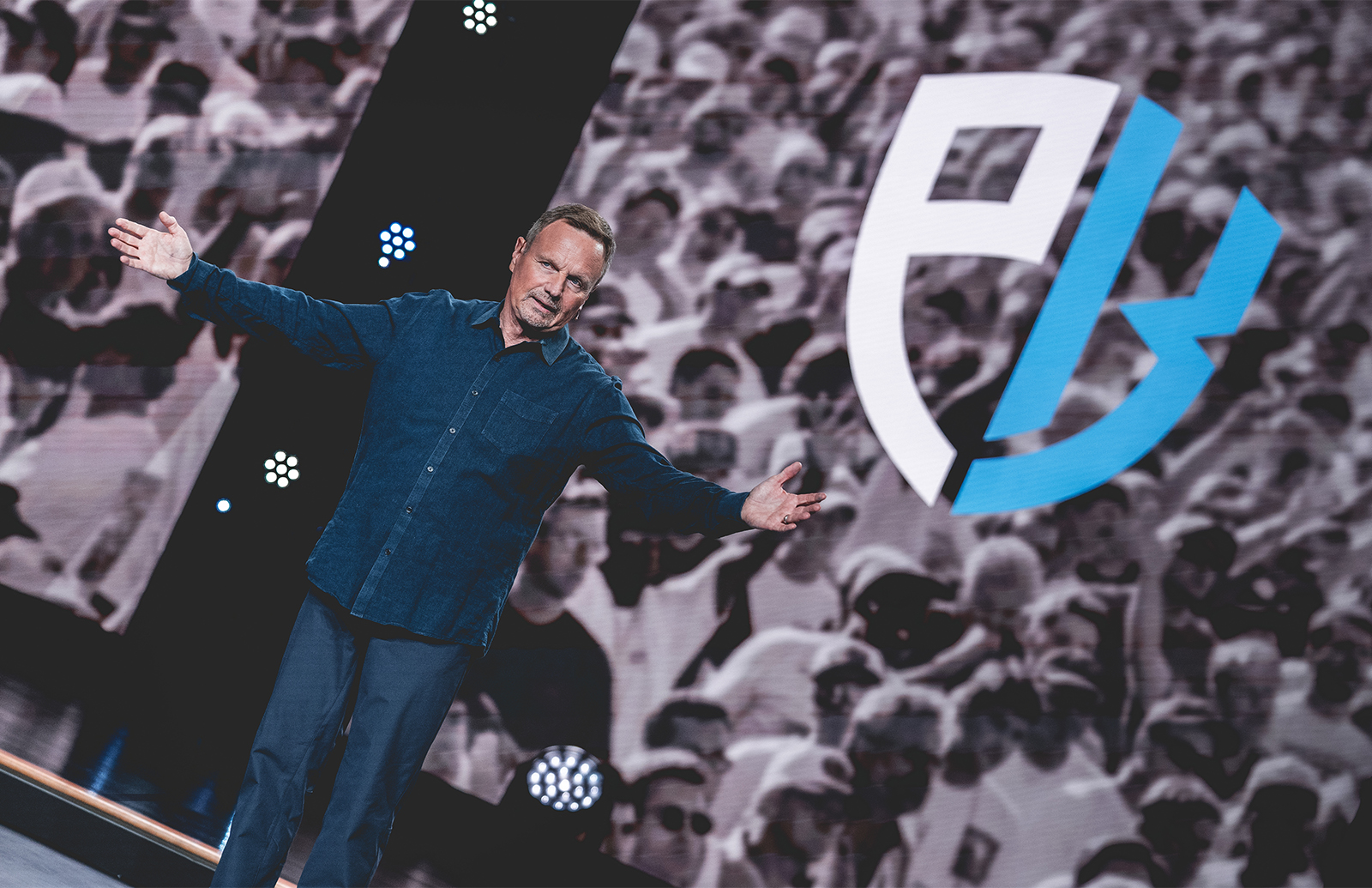
Christian counselor Steve Arterburn presents during a recorded session for the Promise Keepers 2020 virtual experience. Photo courtesy of Promise Keepers
The 2020s, though, to put it mildly, are not the 1990s. The cultural flashpoints of the late 20th century are downright lightning rods two and a half decades later. An organization once committed to a post-political future has reemerged into a culture entrenched in a bitter partisan battle.
The tentpole issues of Promise Keepers remain familiar — reclaiming a biblical manhood, abolishing racism, standing firm for the Christian faith. But in conservative Christian America, all conversations about race have been conflated with opposition to critical race theory and George Floyd protests. Concerns about manhood have narrowed to rejection of feminism and LGBTQ rights.
These attitudes lay beneath the surface even in Promise Keepers’ glory days. As a coach working with many Black players and grandfather to a half-Samoan child, McCartney had a passion for racial reconciliation and ensured it was a dominant theme of the rallies, according to a recent Christianity Today article. But both McCartney and current CEO Harrison, who started his unpaid role three and half years ago, have said their organization declined in part due to growing criticism that it overemphasized bridging racial divides.
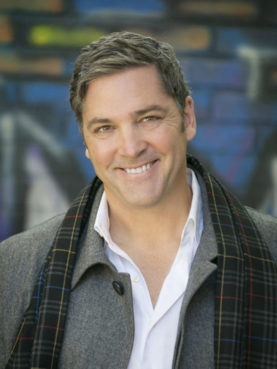
Ken Harrison. Courtesy photo
While it preached racial unity — and was more likely than other evangelical organizations at the time to feature Black pastors such as Tony Evans, E.V. Hill and Wellington Boone and sports celebrities like Reggie White — the overwhelming majority of its adherents were white men.
A.R. Bernard, a Black pastor in Brooklyn and Promise Keepers board member, said he doesn’t believe racial reconciliation was the problem, but rather a lack of a strategy to address it. The rallies focused primarily on racism as a personal failing, calling on the white men in attendance to repent of racism and to find a Black man in the crowd to hug.
“That colorblind approach came out of a specific evangelical hermeneutic,” said Bernard. “If you change the heart of the individual, you’ll change the overall.
“But the problem is individuals create systems and structures that promote marginalization.”
Bernard has been asked to speak at the 2021 Promise Keepers on the topic of obedience and unity. He’ll get to that, he said, “but I am going to direct myself to some of the social issues and realities around race. Around America’s continuing struggle to find its way out of its societal contradictions.”
Bernard is well aware that in 2021 such talk is bound to bring cries of “CRT!”
“The language has been hijacked,” he said. “Critical race theory has been hijacked by the extremes: the political left and right.”
He believes Promise Keepers has a responsibility to take back that language but also to help clarify the terms. “If what we mean by CRT is an honest evaluation of the historic role race and racism has played in American systems and structures, then I’m all for that. But if we are to weaponize it, to make white people feel guilty beginning at pre-K and Kindergarten, I’ve got a problem with that.”
Du Mez said she will be surprised if issues of racism play as central a role in the new iteration of Promise Keepers, given the fraught cultural moment. If they do, she expects a throwback to the colorblind approach. “I imagine there’s going to be an emphasis on unity, on being nice to each other. And that goes all ways — people of color need to be kind and loving and seek unity with white people.”
If race has been decentered, gender and sexuality have been shoved to the forefront.
In May, USA Today journalist Mike Freeman urged the Cowboys not to allow Promise Keepers to use the AT&T Stadium because it would “mainstream hate speech.” He cites an April interview of Harrison with former Trump administration aide Steve Bannon on a “Real America’s Voice” podcast in which Harrison criticized transgender men.
After the Dallas Observer published a recent headline “An Expected 80,000 Christian Men Afraid of Men Wearing Dresses Will Gather in Dallas,” Promise Keepers shot back in a press release: “In an age where you can grab friendly headlines for announcing you’re a demisexual or stocking gender fluid clothing, nothing is more predictable — and deplorable — than mainstream media seeking to cancel a religious gathering of Christian men seeking to be better men.”
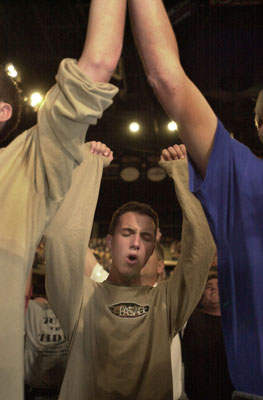
A teenage boy participates in a Promise Keepers event, wearing a “Passage” T-shirt promoting a one-day conference in Columbus, Ohio, sponsored by the men’s ministry. Photo courtesy of Promise Keepers
In an interview with Religion News Service in April, after the Bannon appearance, Harrison said everyone, including gay and trans men, is welcome at Promise Keepers, and “we are not intending on bashing anybody.”
While Harrison confirmed Promise Keepers’ “biblical” stance on marriage defines it as between one man and one woman, he said, “it’s not even really going to be something that gets brought up,” adding, “we’re going to stick on what the Bible says, but we’re not calling people out.”
Kevin Garcia, who identifies as queer and goes by they/them pronouns, remembers attending a Promise Keepers event in the late ’90s that focused on “integrity, masculinity and taking up the mantle of manhood.” No one talked about sexual orientation, Garcia said, but, then, why would they? “There was an assumed norm, like you just understood in this space we all agree marriage is between one man and one woman, so of course you don’t need to have a conversation about homosexuality as a problem that real Christians deal with.”
As with race, sexuality may be more difficult for the group to ignore in Promise Keepers’ new iteration. Maybe most difficult to finesse of all will be politics in the post-Trump era.

Men raise their hands in prayer and worship at the Promise Keepers “Stand in the Gap” rally on Oct. 4, 1997, at the National Mall in Washington, D.C. The rally was billed as a “sacred assembly.” Photo by Mark Abraham
Promise Keepers of the 1990s advertised itself as apolitical, but according to Du Mez, the media wasn’t buying it. “If you looked at who was sponsoring these events, who was really behind them, it was James Dobson, was all these conservative characters,” she said.
Harrison’s appearance on the Bannon podcast did not do much to dissuade today’s media from putting the new Promise Keepers squarely in the MAGA camp.
Its board members, too, include past advisers to the former president, such as Samuel Rodriguez. (Bernard stepped down as a Trump adviser early in the presidency as “a moral decision.”) Oklahoma Senator James Lankford and Tennessee pastor Steve Berger, who was spotted at the Jan. 6 insurrection at the U.S. Capitol (he walked through “to observe the situation and pray,” he has said) also serve on the board.
The overt Christian display on Jan. 6, Bernard said, is one reason he accepted the position on the board: He sees himself as a bridge builder. “I’m not going to agree with everything people in the room say. If I can bring another perspective to be considered, then I’m doing my job.”
For his part, Harrison told RNS in April that he thinks men should stop seeing themselves as political activists and that “it’s unfortunate how much anger there is in this country.”
When asked to comment on Jan. 6 and the number of men sporting Christian symbols among the rioters, Harrison said he wanted to stay out of it. “I wasn’t there. I don’t want to run around condemning anybody.”
“Condemn is such a strong word,” he added.
Adelle Banks contributed to this report.
